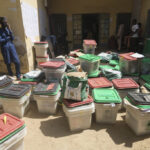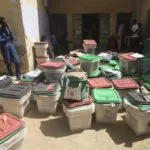
Residents of Edo, South-South Nigeria, are slated, on Sept. 21, to vote for a new governor to take over the affairs of the state from Godwin Obaseki, who is expected to complete his second term tenure on Nov. 11, 2024.
Although there are 17 political parties and candidates contesting, the people have their attention on the three major candidates. They are Asue Ighodalo of the Peoples Democratic Party (PDP), Monday Okpebholo of the All Progressives Congress (APC) and Olumide Akpata of the Labour Party.
Like previous polls, the Independent National Electoral Commission (INEC) chairman, Professor Mahmood Yakubu, has confirmed the electoral umpire’s readiness for the upcoming election and also expressed confidence in the ability of his personnel to conduct credible elections.
But there are concerns over many signs of impending violence, especially after the incumbent governor, Obaseki declared that the governorship election is a ‘do-or-die’ affair. He made the call in the presence of the acting National Chairman of PDP, Illiya Damagum, who also swore that his members would defend their votes ‘with blood’. Also, Ighodalo, the party’s candidate has refused to sign a peace accord ahead of Saturday’s poll.
Reason for off-cycle poll in Edo
Off-cycle elections take place outside the general elections schedule due to circumstances including death, resignation, impeachment, annulment of elections by courts, and many more.
In the case of Edo, off-cycle elections began after the 2007 general elections. After INEC declared PDP’s Oserheimen Osunbor, as the winner of the state’s governorship poll, the candidate of the defunct Action Congress of Nigeria (ACN) Adams Oshiomhole, challenged the outcome in court. In November 2008, the court pronounced Oshiomhole as the duly elected governor of the state.
Oshiomhole was thereafter sworn in as governor for a four-year term. Since then, Edo governorship elections usually come a year after general elections.
Interestingly, the upcoming Edo election is the first off-cycle election under the watch of President Bola Tinubu.
Insecurity
Nigeria’s Electoral Act opposes violence connected to elections and is punishable with up to four years imprisonment, or a fine of ₦500,000 or both. But there have been many past instances where politicians and political thugs showed a lack of respect for the law.
According to Kimpact Development Initiative (KDI), a Nigerian democracy and governance think tank, Edo State recorded 19 major incidents of pre-election violence between April and July 2024.
The election-related violence recorded by the KDI included shootings and assaults that left victims injured. In one of the incidents recorded in July, gunmen ambushed the convoy of Okpebholo and Deputy Governor Philip Shaibu at the Benin Airport. The attack led to the death of Inspector Akor Onuh, one of Okpebholo’s security aides.
While the his political party accused state security forces, particularly the Edo State Security Network (ESSN), of orchestrating the attack, the opposing party blamed them for carrying weapons in the presence of security operatives. Since then, there has been political violence in areas like Igarra, Ososo, Ekperi, Uhomora, and Ekpoma, where supporters of both parties have clashed.
Reacting to the failure of the candidate to sign the peace accord despite reported cases of violence during campaigns, Austin Aigbe, an electoral observer and member of the West African Democracy Solidarity Network, who appeared on Arise Television on Tuesday, said Ighodalo’s action sends a wrong signal to the citizens ready for a free and fair election.
Aigbe argued that not signing the accord means he is “afraid that you want to lose the elections, that’s one. Two, because you want to engage in violent negotiations, that is why you have come out that you are not signing.”
“I know that the peace accord is a moral document, it has no force of law, but morals are very critical to perception. I would expect that the party would have signed openly and made a comment so clear that we are signing for the sake of peace, but this needs to be addressed, otherwise, the forthcoming election cannot be guaranteed by way of free, fair, and credibility,” he argued.
Will heavy security deployment contain violence?
Nigeria’s Inspector General of Police, Kayode Egbetokun, has promised neutrality of police and warned that securing voters and election materials rests squarely on the police, who other national security agencies will support.
Egbetokun added that aside from 35,000 police personnel earmarked to provide security during Saturday’s election, 8,000 military and other sister agencies would be deployed to man the waterways, and the entry and exit parts of the state.
“I reaffirm our commitment to a peaceful and secure electoral process. We recognise the importance of this moment, and the trust placed in us to protect the integrity of this election. We will remain impartial, professional, and vigilant while providing a level playing ground for political parties and their candidates,” Egbetokun said. “For those who may be thinking of using violence to disrupt the election, I have a warning for them. Any person or persons found bearing any offensive weapon on the day of election will be treated instantly as an armed criminal.”
Despite his assurances of neutrality, Edo governor Obaseki said he has no confidence in the police and the deployment of a whopping 35,000 policemen.
While no one is sure of what will happen in the coming days, many Nigerians are hopeful that police will rise above partisanship and provide a level playing field for all candidates.
Time for INEC to redeem itself
However, many Nigerians have said the election is an opportunity for INEC to redeem itself since the controversial 2023 general elections.
“I hope that INEC staff would not be involved in irregularities like we witnessed in the last general elections where people were caught with pre-filled result sheets before the elections started. Nigerians also hope that their officials will not upload fictitious figures into IReV,” said Ebi Ofoure, a concerned resident of Edo State.
Although the PDP has called on the INEC to redeploy Edo Resident Electoral Commissioner (REC), Anugbum Onuoha, over alleged ties with FCT Minister Nyesom Wike, who is currently an ally of APC leaders, the electoral body has objected, urging the PDP “to focus on the process of the election and not on the REC.”
Residents of Edo State in South-South Nigeria will vote on Sept. 21 to elect a new governor, with the main contenders being Asue Ighodalo (PDP), Monday Okpebholo (APC), and Olumide Akpata (Labour Party).
The election is amidst concerns of potential violence, especially after the incumbent governor Obaseki deemed the election a ‘do-or-die’ affair and PDP officials vowed to defend votes ‘with blood’.
The election results from 2007 were contested and led to off-cycle elections in Edo, setting a precedent for the upcoming poll, which is the first under President Bola Tinubu.
There have been numerous incidents of pre-election violence, including the death of a policeman during an attack on a candidate’s convoy, prompting heavy security measures involving 35,000 police and additional military personnel.
Despite these efforts, there are doubts about the neutrality of the security forces and the integrity of INEC, particularly following controversial practices in the 2023 general elections.
